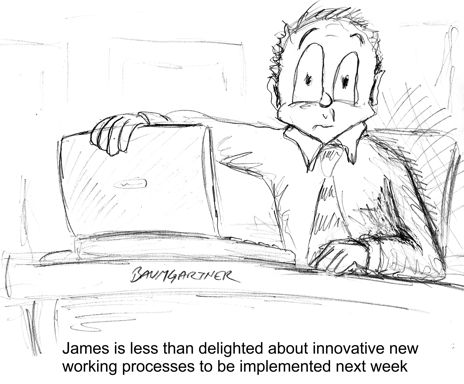
Why Employees Often Despise Innovation
Good morning,
I have been asked by your CEO to inform you that the company is implementing an innovative new business model that will change the way our organisation works. Efficiency will be vastly improved while allowing us to serve our customers faster, better and in creative new ways that will ensure we become the market leader once again. Moreover, thanks to efficiency gains, we can close down some operations, which will reduce our operating costs significantly.
Our exciting new business model means that there will be significant changes in your working tasks and a new software tool you will need to use. But don't worry, there will be a comprehensive training programme starting Monday morning at 9:00.
We are sure you are as excited as we are by the innovative changes that we are putting in place. These changes are the result of creative ideas that were developed at the management creativity retreat in Venice last month and are evidence of our organisation's dedication to creativity and innovation!
Yours faithfully,
Jeffrey on behalf of management
How Do You Feel?
How does that letter make you feel? Perhaps I should ask: how would that letter make you feel if it came from the management of your organisation? The answer is probably not, "delighted". More likely, it would be "unhappy", "stressed", "concerned" or something similar.
Yet, as much as business leaders like to trumpet their adoration for innovation,
employees within the company are more likely to equate innovation with unexpected
and unwanted change. Radical innovation means radical change. For the typical
employee, that could mean anything from changing the way she works to losing
her job.
How Do People Respond
As a result, people tend to respond negatively to innovation and the creativity that fuels innovation. This has been demonstrated time and again in research. Dislike of creativity leads to negative feedback on new ideas: "it will never work", "our customers will hate it", "it will ruin our company". In truth, these criticism cover up the employee's real concern with the innovative new idea, which might be phrased: "I am afraid of how this idea will affect my work, the respect I have for doing my job well and my future."
In worst case scenarios, people may even sabotage innovative new processes
to ensure they fail. Such actions may be conscious or unconscious; people desperately
want the new, unknown process to fail so that their criticism is proven and
they can return to their secure, old ways of working however inefficient.
What Can You Do?
What can you do if you are in charge of overseeing the implementation of a big innovation? The first thing to do is to realise that a lot of people will not like the idea and the be prepared. People will probably put forth resistance. You may even get bad publicity of workers go on strike or complaining about your company in social media -- especially if lay-offs are involved. In addition to your employees, business pundits, suppliers and others may be critical of your idea. After all, you are embarking on something new and unproven.
You also need to be aware that the one thing your employees dislike more than
change is change over which they have no control. Thus, working with employees
to talk about the innovation and co-designing the ways that you implement the
innovation enables employees to invest in the new idea. They are able to visualise
the change and how it will affect them. As a result, the change becomes less
scary. That can make a huge difference in attitude.
Most People Do Not Like Creativity and Innovation
The main thing to bear in mind is that by and large, people dislike creative ideas and innovation, especially when it affects them. In spite of what they say, most people do not like to try out new things, even when it is relatively simple For example, I often suggest brainstorm facilitators try doing a session in which participants are allowed to criticise ideas during idea generation -- breaking a fundamental rule of brainstorming. Most brainstorm facilitators refuse even to consider trying this change. They find it easier to claim my suggestion will never work, than to try a simple experiment. But those few facilitators brave enough to try something new are inevitably pleasantly surprised by the results. If creativity facilitators are reluctant to change, imagine how much harder it is for people who are indifferent to creativity!
Wrapping Up
What all this comes down to is this: if your organisation comes up with a breakthrough innovation idea, you will find that your colleagues are most likely not jumping for joy, but rather jumping to criticise. Be prepared for the negative reaction and involve as many people as possible in the implementation of the innovation.




